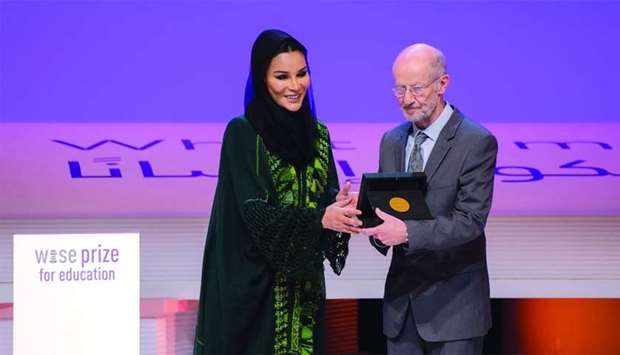Her Highness Sheikha Moza bint Nasser, Chairperson of Qatar Foundation on Wednesday presented the 2019 WISE Prize for Education to Larry Rosenstock, CEO and founding principal of High Tech High ( HTH), a network of American public charter schools in San Diego, California.
Rosenstock received the accolade in front of an audience of more than 3,000 participants from over 100 countries at the opening session of the World Innovation Summit for Education (WISE). The audience consisted of world leaders in education as well as thought leaders and experts in modern education.
On receiving the award, Rosenstock said: “I am tremendously honoured to receive this prize from such a distinguished jury. For me to be in the company of past winners of this prize, who have now made an impact in education around the world, is very moving.
“I hope the prize will allow us to share the work of High Tech High students and teachers even more widely. The prize confirms two of my strongest beliefs: that the work of hands and minds can and must be integrated in our schools. And that all young people are capable of doing work that matters, when we give them the opportunity.”
Announcing the prize, WISE CEO Stavros N Yiannouka said that the WISE Prize for Education is the first distinction of its kind to acknowledge an individual for an outstanding contribution to education.
“The prize aims to raise awareness about the crucial role that education plays in all societies for creating a platform for innovative and practical solutions to alleviate some of the challenges around the world,” he said.
“The work of the 2019 laureate encapsulates the essence of the prize. His decades long work on education was a force for positive individual and social transformation manifested through impactful work and tangible achievements as a visionary educator, policymaker, thinker, and social entrepreneur,” noted Yiannouka.
Rosenstock is recognised for his lifelong dedication to rethinking K-12 learning and tackling inequality through education. He has pioneered the concept of project-based education – the idea that students can and must learn crucial academic skills through hands-on projects that integrate multiple disciplines, engage their interest, and have an authentic purpose. His model also reimagines the role of teachers as designers who adapt their curricula and blend a variety of subjects based on the specific needs of each student.
A commitment to lifting the status of disadvantaged youth has been the driving force of Rosenstock’s professional journey.
Early in his career, and despite his training in law, Rosenstock chose to teach carpentry to inner-city high school students in the 1960s in Boston at the height of desegregation. Through this experience, he recognised the inherent value in vocational education and training and the strong abilities of these students, who were not given equal academic opportunities.
This led him to pursue a career dedicated to integrating the students who have been historically divided and funneled into two separate tracks, often based on race and class.
In starting HTH, he has emerged as an innovator who has created a visible model that shows what is possible in schools. HTH breaks down a number of barriers: the obstacles to accessing quality education, the separation of academic from technical learning, and the isolation of schools from the community and the real world. Tackling inequalities is at the heart of HTH’s mission, with schools that enrol students through a zip-code based lottery.
The innovative methods pioneered at HTH have helped prepare thousands of students of all ability levels and socioeconomic backgrounds for higher education, citizenship, and a rewarding life of work. This approach has allowed students to reach their full potential, with 98% of HTH students accepted to university, versus 69% nationwide.


